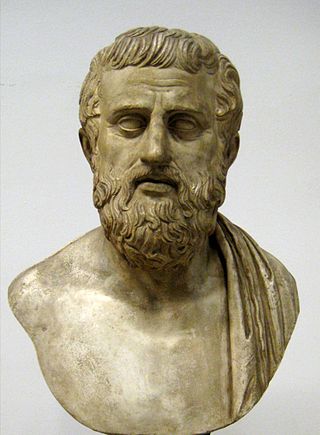
Sophocles was an ancient Greek tragedian, known as one of three from whom at least one play has survived in full. His first plays were written later than, or contemporary with, those of Aeschylus; and earlier than, or contemporary with, those of Euripides. Sophocles wrote over 120 plays, but only seven have survived in a complete form: Ajax, Antigone, Women of Trachis, Oedipus Rex, Electra, Philoctetes, and Oedipus at Colonus. For almost fifty years, Sophocles was the most celebrated playwright in the dramatic competitions of the city-state of Athens which took place during the religious festivals of the Lenaea and the Dionysia. He competed in thirty competitions, won twenty-four, and was never judged lower than second place. Aeschylus won thirteen competitions, and was sometimes defeated by Sophocles; Euripides won four.
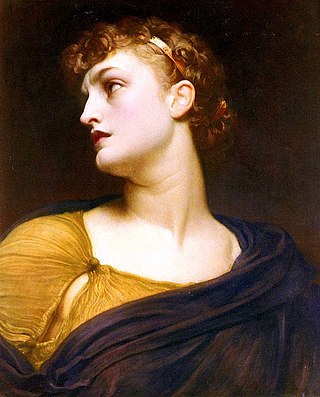
In Greek mythology, Antigone is a Theban princess, and a character in several ancient Greek tragedies. She is the daughter of Oedipus, king of Thebes, and either his mother Jocasta or, in another variation of the myth, Euryganeia. She is a sister of Polynices, Eteocles, and Ismene. The meaning of the name is, as in the case of the masculine equivalent Antigonus, "in place of one's parents" or "worthy of one's parents". Antigone appears in the three 5th century BC tragic plays written by Sophocles, known collectively as the three Theban plays, being the protagonist of the eponymous tragedy Antigone. She makes a brief appearance at the end of Aeschylus' Seven against Thebes, while her story was also the subject of Euripides' now lost play with the same name.

Antigone is an Athenian tragedy written by Sophocles in 441 BC and first performed at the Festival of Dionysus of the same year. It is thought to be the second oldest surviving play of Sophocles, preceded by Ajax, which was written around the same period. The play is one of a triad of tragedies known as the three Theban plays, following Oedipus Rex and Oedipus at Colonus. Even though the events in Antigone occur last in the order of events depicted in the plays, Sophocles wrote Antigone first. The story expands on the Theban legend that predates it, and it picks up where Aeschylus' Seven Against Thebes ends. The play is named after the main protagonist Antigone.
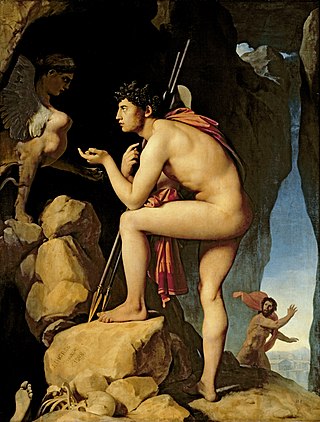
Oedipus was a mythical Greek king of Thebes. A tragic hero in Greek mythology, Oedipus accidentally fulfilled a prophecy that he would end up killing his father and marrying his mother, thereby bringing disaster to his city and family.

In Greek mythology, Eteocles was a king of Thebes, the son of Oedipus and either Jocasta or Euryganeia. Oedipus killed his father Laius and married his mother without knowing his relationship to either. When the relationship was revealed, he was expelled from Thebes. The rule passed to his sons Eteocles and Polynices. However, because of a curse from their father, the two brothers did not share the rule peacefully and died as a result, ultimately killing each other in battle for control of the city. Upon his death, Eteocles was succeeded by his uncle, Creon.

In Greek mythology, Polynices was the son of Oedipus and either Jocasta or Euryganeia and the older brother of Eteocles. When his father, Oedipus, was discovered to have killed his father and married his mother, he was expelled from Thebes, leaving his sons Eteocles and Polynices to rule. Because of a curse put on them by their father Oedipus, the two sons did not share the rule peacefully and died as a result, killing each other in battle for control over Thebes.

Creon, is a figure in Greek mythology best known as the ruler of Thebes in the legend of Oedipus.

In Greek mythology, Tiresias was a blind prophet of Apollo in Thebes, famous for clairvoyance and for being transformed into a woman for seven years. He was the son of the shepherd Everes and the nymph Chariclo. Tiresias participated fully in seven generations in Thebes, beginning as advisor to Cadmus himself.

In Greek mythology, Jocasta, also rendered Iocaste and also known as Epicaste, was a daughter of Menoeceus, a descendant of the Spartoi Echion, and queen consort of Thebes. She was the wife of first Laius, then of their son Oedipus, and both mother and grandmother of Antigone, Eteocles, Polynices and Ismene. She was also sister of Creon and mother-in-law of Haimon.
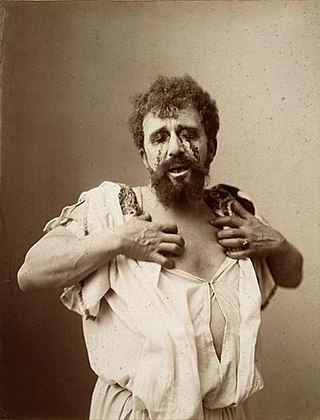
Oedipus Rex, also known by its Greek title, Oedipus Tyrannus, or Oedipus the King, is an Athenian tragedy by Sophocles that was first performed around 429 BC. Originally, to the ancient Greeks, the title was simply Oedipus (Οἰδίπους), as it is referred to by Aristotle in the Poetics. It is thought to have been renamed Oedipus Tyrannus to distinguish it from Oedipus at Colonus, a later play by Sophocles. In antiquity, the term "tyrant" referred to a ruler with no legitimate claim to rule, but it did not necessarily have a negative connotation.
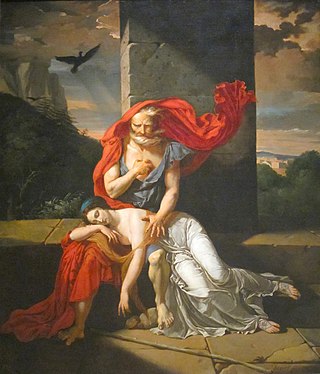
Oedipus at Colonus is the second-last of the three Theban plays of the Athenian tragedian Sophocles. It was written shortly before Sophocles's death in 406 BC and produced by his grandson at the Festival of Dionysus in 401 BC.
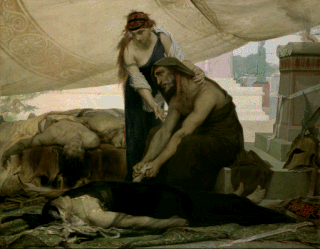
The Phoenician Women is a tragedy by Euripides, based on the same story as Aeschylus' play Seven Against Thebes. It was presented along with the tragedies Hypsipyle and Antiope. With this trilogy, Euripides won the second prize. The title refers to the Greek chorus, which is composed of Phoenician women on their way to Delphi who are trapped in Thebes by the war. Unlike some of Euripides' other plays, the chorus does not play a significant role in the plot, but represents the innocent and neutral people who very often are found in the middle of war situations. Patriotism is a significant theme in the story, as Polynices talks a great deal about his love for the city of Thebes but has brought an army to destroy it; Creon is also forced to make a choice between saving the city and saving the life of his son.

Œdipe (Oedipe) is an opera in four acts by the Romanian composer George Enescu, set to a French libretto by Edmond Fleg. It is based on the mythological tale of Oedipus, as told by Sophocles in Oedipus the King.
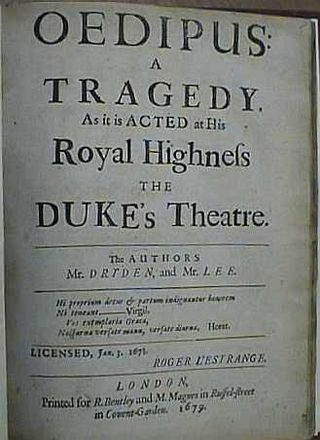
The heroic drama Oedipus: A Tragedy, is an adaption of Sophocles' Oedipus Rex, written by John Dryden and Nathaniel Lee. After being licensed in 1678 and published in 1679, it became a huge success on stage during the Restoration period.

Oedipus Rex is a 1967 Italian film directed by Pier Paolo Pasolini. Pasolini adapted the screenplay from the Greek tragedy Oedipus Rex written by Sophocles in 428 BC. The film was mainly shot in Morocco. It was presented in competition at the 28th Venice International Film Festival. It was Pasolini's first feature-length color film, but followed his use of color in "The Earth Seen from the Moon" episode in the portmanteau film The Witches (1967).
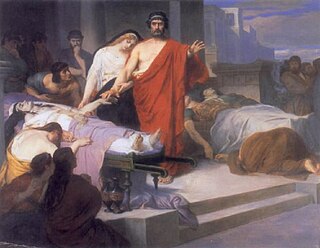
Oedipus is a fabula crepidata of c. 1061 lines of verse that was written by Lucius Annaeus Seneca at some time during the 1st century AD. It is a retelling of the story of Oedipus, which is better known through the play Oedipus Rex by the Athenian playwright, Sophocles. It is written in Latin.
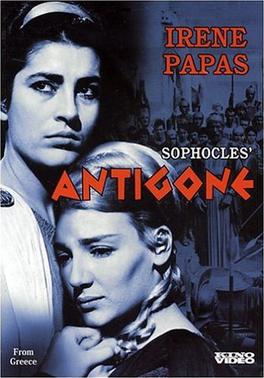
Antigone is a 1961 Greek film adaptation of the Ancient Greek tragedy Antigone by Sophocles. It stars Irene Papas in the title role and was directed by Yorgos Javellas.

Oedipus rex is an opera-oratorio by Igor Stravinsky, scored for orchestra, speaker, soloists, and male chorus. The libretto, based on Sophocles's tragedy, was written by Jean Cocteau in French and then translated by Abbé Jean Daniélou into Latin; the narration, however, is performed in the language of the audience.
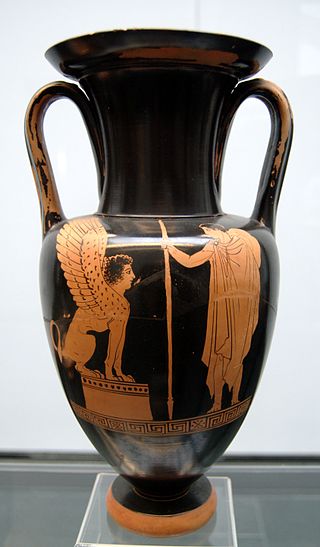
Oedipus is a play by the 5th-century BCE Athenian dramatist Euripides. The play is now lost except for some fragments. What survives of the play covers similar ground as Sophocles' acclaimed Oedipus Rex, but scholars and historians have found there are significant differences. In Oedipus Rex, the title character blinds himself upon learning his true parentage, accidentally killing his father and marrying his mother Jocasta. In Euripides' play, however, it appears Oedipus is blinded by a servant of his father Laius, Oedipus' predecessor as king of Thebes. Furthermore, Euripides' play implies Oedipus was blinded before it was known that Laius was his father. Also, while in Sophocles' play Jocasta kills herself, remaining fragments of Euripides' play depict Jocasta as having survived and accompanied Oedipus into exile.
Oedipus Rex is a 1957 film, a film version of the Canadian Stratford Festival production of the William Butler Yeats adaptation of the play Oedipus Rex by Sophocles.




















